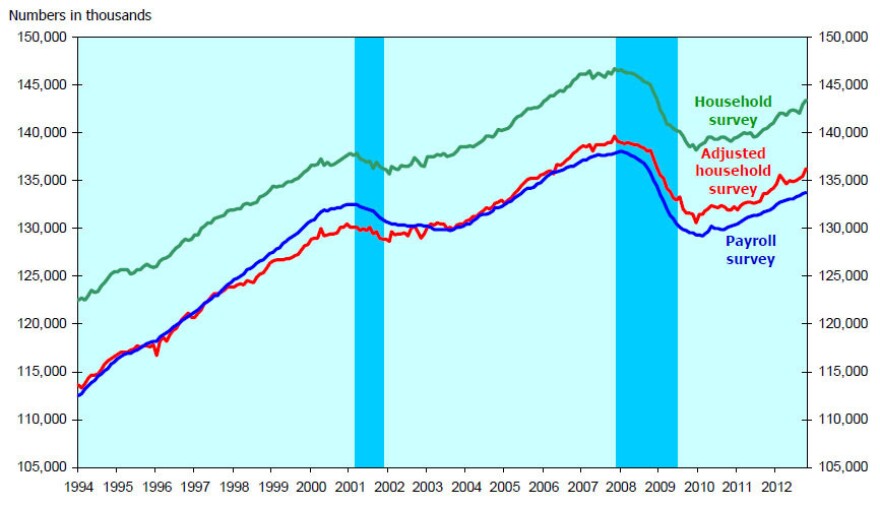Each month, the Labor Department issues an employment report. On Friday, that report showed job creation rose in October — and it revealed something more.
With its latest unemployment assessment, the government in effect took a BEFORE snapshot of the U.S. economy. It collected all of the data before Superstorm Sandy slammed into the East Coast and before the election outcome could be known. Each of those two events has the potential to change the AFTER outlook.
The October report showed employers added 171,000 jobs — more than the 125,000 that most economists had been predicting. And both August and September had upward revisions, suggesting job growth has been stronger lately than previously thought.
The October jobless rate did increase a 10th of a point to 7.9 percent. But the uptick generally was interpreted as good news because it reflected a surge of applicants entering the labor market. Having 578,000 more people in the hunt for a job suggests optimism is rising.
Still, last month's report had plenty of bad news, too. Some 12.3 million people are still looking for paychecks, and wages remain essentially flat. The economy would have to be generating roughly 350,000 jobs a month to get the unemployment rate back down under 6 percent within three years.
A Mixed Snapshot
So, most economists saw this BEFORE snapshot as mixed. It revealed a still-cloudy job market, but one with some bright rays, especially in the retail, construction, hospitality and health care industries.
After studying the statistics, "one can have very different readings of the temperature of the recovery," Sharon Poczter, an economics professor at Cornell University, concluded in a written analysis.
Those who believe the job market is heating up had no trouble finding evidence to support their optimism. Nigel Gault, chief U.S. economist for IHS Global Insight, a forecasting firm, saw "a brighter picture" in the numbers.
"There was good news in both construction and retail employment, consistent with the better news coming in from the housing market and with an improving consumer mood," Gault said in his analysis.
But former Massachusetts Gov. Mitt Romney, who is challenging President Obama for the White House, said the job market, filled with part-time workers and millions of long-term unemployed, remains much too weak.
At a rally in Wisconsin, Romney said "unemployment is higher today than when Barack Obama took office." Obama took office on Jan. 20, 2009. The unemployment rate was 7.8 percent that January, but it shot to 8.3 percent in February — the first full month following the Bush administration.
What About November?
Whatever the job market reality was this past month, it may well be different in November, both because of Superstorm Sandy and because of the election results.
First, Sandy is having a huge impact on the East Coast, where physical damage is extensive and business-activity losses are mounting. Millions of people who work in restaurants, factories and offices are sitting at home, unable to work because of power outages and transportation breakdowns. Financial losses for their employers might lead to layoffs in coming weeks.
Economists generally are putting the total losses at somewhere around $50 billion.
But on the other hand, those losses likely will lead to job creation in November and December in the construction industry and elsewhere. Builders may go on a hiring binge to help families scrambling to fix and rebuild homes before Christmas. Companies that make building materials, such as roofing and lumber, may have to add employees.
Tuesday's election results also could have an impact on jobs. Economists are unanimous in saying job growth is being slowed by the uncertainty surrounding the "fiscal cliff" — an elaborate cluster of tax-and-spending changes coming at year's end.
"Uncertainty harms the economy by reducing consumers' level of spending on goods and services and lowering levels of investment and hiring by firms," says John Makin, an economist with the American Enterprise Institute.
If Congress and the White House were to make progress in November and December toward removing that uncertainty, job creation could accelerate in coming months.
Copyright 2020 NPR. To see more, visit https://www.npr.org. 9(MDA4MDYxNjY4MDEzMTQ2OTkxMzkyOWU2NQ004))





